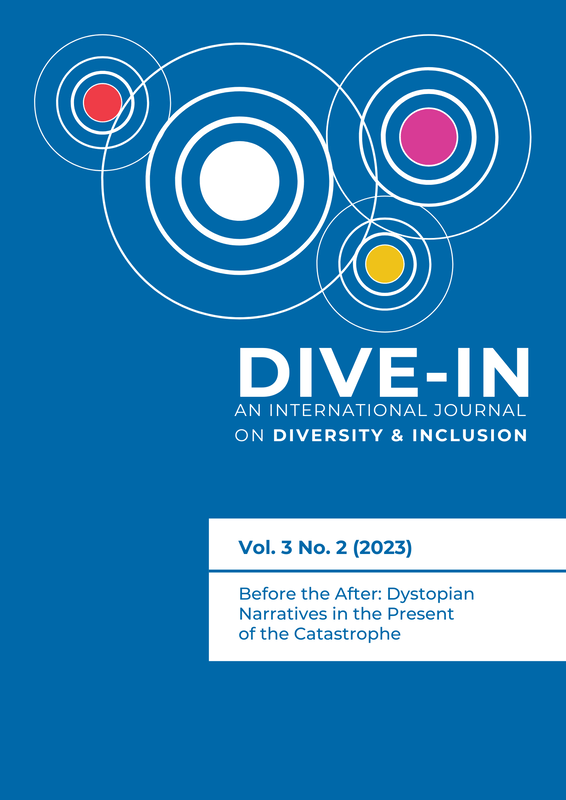Consumed Bodies and Unhinged Women. The dystopian worlds of Murata Sayaka’s Seimeishiki (Life Ceremony, 2013) and Ono Miyuki’s Karada o uru koto (“Selling the Body,” 2020)
DOI:
https://doi.org/10.6092/issn.2785-3233/19140Keywords:
Murata Sayaka, Ono Miyuki, dystopian fiction, Posthuman, bodyAbstract
This paper investigates the representation of bodies in two contemporary Japanese works, namely Murata Sayaka’s Seimeishiki (生命式 , Life Ceremony, 2013) and Ono Miyuki’s Karada o uru koto (身体を売ること “Selling the Body,” 2020). Both novellas are set in the future and share the trope of the ‘uncanny,’ heightened through the transgression of boundaries thanks to the presence of what I refer to as ‘consumed bodies,’ and female protagonists as an ‘unhinged woman,’ the anti-heroine interpreted as a feminist icon recently emblazoned in social networks. In Life Ceremony, the Japanese government has approved anthropophagy as a social practice; in “Selling the Body,” healthy flesh bodies are sold to survive in polluted environments and replaced by robotic ones. Present anxieties concerning the control over bodies and their reproductivity, as well as the fear of objectification are expressed through the practices of cannibalism and cyberization. Consequently, readers are forced to rethink the human nature and ethics in a posthuman dialectic within a hyper-capitalistic society.
References
Baccolini, Raffaella. 2012. “Ursula K. LeGuin’s Critical Dystopias.” In M. Keith Booker (ed.), Critical Insights: Dystopia, 37–53. Ipswich, MA: Salem Press.
Balsamo, Anne. 1996. Technologies of the Gendered Body. Reading Cyborg Women. Durham and London: Duke University Press.
Braidotti, Rosi. 2013. The Posthuman. Cambridge: Polity Press.
Brown, Steven J. 2010. Tokyo Cyberpunk. Posthumanism in Japanese Visual Culture. New York: Palgrave Macmillan.
Creed, Barbara. 1993. The Monstrous Feminine: Film, Feminism, Psychoanalyses. New York: Routledge.
De Fren, Allison. 2009. “Technofetishism and the Uncanny Desires of A.S.F.R. (art-sex-fetish-robots).” Science Fiction Studies 23(3), 404–440.
Dumas, Rachel. 2018. The Monstrous Feminine in Contemporary Japanese Popular Culture. New York: Palgrave Macmillan.
Endō, Toshiaki. 2019. Disutopia fikushon ron. Akumu no genjitsu to taiji suru sōzō ryoku – Is this the life we really want? (On Dystopian Fiction. Imagination Confronting Nightmare Reality – Is this the life we really want?). Tōkyō: Sakushinsha.
Halberstam, Judith, & Ira Livingstone (eds.). 1995. Posthuman Bodies. Bloomington and Indianapolis: Indiana University Press.
Harada, Kazue. 2022a. Sexuality, Maternity, and (Re)productive Futures. Women’s Speculative Fiction in Contemporary Japan. Boston: Brill.
Harada, Kazue. 2022b. “Cannibalistic Space and Reproduction in Japanese Speculative Fiction.” In Mina Qiao (eds.), Into the Fantastical Spaces of Contemporary Japanese Literature, 71–93. London: Lexington Books.
Haraway, Donna. 1991. Simians, Cyborgs, and Women. The Reinvention of Nature. London: Free Association Books.
Hall, Milan. 2022. “The New Girlboss: The Unhinged Woman.” Nubian Message, 14 October 2022. https://www.thenubianmessage.com/2022/10/14/the-new-girlboss-the-unhinged-woman/ [last accessed on 09/09/2023].
Iida, Yūko. 2020. “Saiseisan – seishoku no saihaichi ni mukete. Gendai josei sakka ni yoru itsutsu no jikken” (“Towards the relocation of reproduction and reproduction: Five experiments by contemporary female writers”). Nihon bungaku 69(11), 12–22.
Ishida, Hitoshi. 2023. “Disutopia de kuia na nihongo bungaku he” (Towards a Dystopian and Queer Literature in Japanese). Waseda daigaku kokusai bungakukan jānaru (Journal of Waseda International House of Literature) 1(1), 41–44.
Kristeva, Julia. 1982 (1980). Pouvoirs de l’horreur. Essai sur l’abjection. Paris: Seouil. Transl. Leon S. Roudiez, Powers of Horror. An Essay on Abjection. New York: Columbia University Press.
Mohr, Dunja M. 2005. Worlds Apart? Dualism and Transgression in Contemporary Female Dystopias. Jefferson: McFarland.
Murata, Sayaka. 2022 (2019). Seimei shiki. Tōkyō: Kawade shobō shinsha. Transl. J. Tapley Takemori, Life Ceremony. London: Granta.
Nakamura, Miri. 2015. Monstrous Bodies. The Rise of the Uncanny in Modern Japan. Cambridge (MA): Harvard University Press.
Nakazawa, Tadayuki. 2018. “Murata Sayaka no ‘monogatari’ to ‘watashi.’ Datsu (nijyūseiki nnihon) bungaku-shi shiron” (“Murata Sayaka’s ‘narrative’ and ‘I:’ an essay on (21st century Japan) de-literature history”). Bungaku + 1(1), 194–209.
Napier, Susan J. 1996. The Fantastic in Modern Japanese Literature. The Subversion of Modernity. London & New York: Routledge.
Ono, Miyuki. 2020. Karada o uru koto (Selling the Body). On Note: https://www.hayakawabooks.com/n/n7828d7d03c07 [last access on 9/09/2023].
Qiao, Mina (ed.). 2023. The Coronavirus Pandemic in Japanese Literature and Popular Culture. London: Routledge.
Saitō, Minako. 2018. Nihon no dōjidai shōsetsu (Contemporary Novels of Japan). Tōkyō: Iwanami shinsho.
Serrano-Muñoz, Jordi. 2021. “Closure in Dystopia: Projecting Memories of the End of Crises in Speculative Fiction.” Memory Studies 14(6), 1347–1361.
Shunyata, Kaiya. 2023. “Booktok’s infatuation with ‘sad girl’ novels is as complex as the book themselves.” Daily Dot, updated on 26 July 2023. https://www.dailydot.com/unclick/booktok-sad-girl-novel-feature/ [last accessed on 09/09/2023].
Tensor Posadas, Byron. 2018. Double Visions, Double Fictions. The Doppelgänger in Japanese Film and Literature. Minneapolis & London: University of Minnesota Press.
Specchio, Anna. 2018. “Eutopizing the Dystopia. Gender Roles, Motherhood and Reproduction in Murata Sayaka’s Satsujin shussan.” Metacritic Journal for Comparative Studies and Theory (4), 94–108.
Specchio, Anna. 2020. “No Sex and Paradise City: A Critical Reading of Murata Sayaka’s Shōmetsu sekai 消滅世界 (2015).” Kervan. International Journal of Afro-Asiatic Studies 24(2), 373–396.
Specchio, Anna. 2022. “Women and Queer Kinships: Matsuura Rieko, Fujino Chiya, and Murata Sayaka.” In Rebecca Copeland (eds), Handbook of Modern and Contemporary Japanese Women, 209–223. Tōkyō: MHM Japan Documents.
Downloads
Published
How to Cite
Issue
Section
License
Copyright (c) 2023 Anna Specchio

This work is licensed under a Creative Commons Attribution 4.0 International License.





